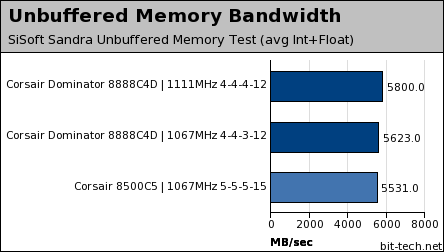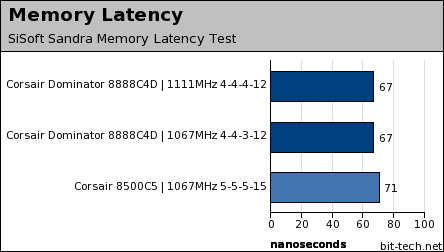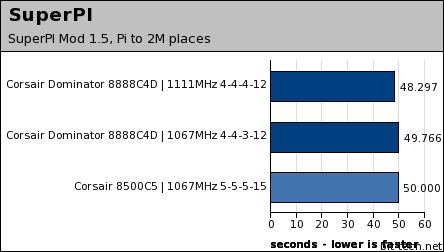
Test Setup:
Intel Core 2 Duo E6600; Asus P5B Deluxe WiFi-AP Edition (Intel P965 Express); ATI Radeon X1950XTX 512MB; Seagate 7200.9 200GB SATA 3Gbps hard drive; OCZ GameXtreme 700W PSU; Windows XP Professional Service Pack 2; DirectX 9.0c; ATI Catalyst 6.8 beta.Memory Modules:
- Corsair Dominator Twin2X2048-8888C4DF - running at 1111MHz, 4-4-4-12, 2.4V*;
- Corsair Dominator Twin2X2048-8888C4DF - running at 1067MHz, 4-4-3-12, 2.4V;
- Corsair Twin2X2048-8500C5 - running at 1067MHz, 5-5-5-15, 2.1V

Testing problems:
The first problem we encountered was our choice of platform - there are very few motherboards out there that are capable of running Corsair's Dominator PC2-8888 modules at their full potential. We tried two different 975X-based Core 2 Duo motherboards; namely the Asus P5W DH Deluxe and the DFI Infinity 975X/G - neither were up to the task of running the Dominator memory at its rated speeds, nevermind any higher.There are also very few socket AM2 boards that are capable of running at these frequencies too - Corsair tells us that Asus' M2N32-SLI Deluxe and Crosshair motherboards should both be capable of reaching the required clock speeds. We finally settled on using Asus' rather good P5B Deluxe mobo, as this has been one of the best overclocker's boards we've had in the office for some time now - it had no problems reaching the required memory frequencies and provided sufficient DRAM voltage adjustments too.
Sisoft Sandra Memory Bandwidth & Latency:
Before we get on to our real-world benchmarking suite, we've run a couple of synthetic benchmarks to show the theoretical performance benefits of using tighter memory timings. The first thing we looked at was Sisoft Sandra 2007 memory performance - we used the Unbuffered Memory and Memory Latency tests to gauge theoretical memory performance.

SuperPI Mod 1.5:
SuperPI Mod 1.5 is a popular benchmark among enthusiasts and the results are affected by memory bandwidth. You can download a copy of the application from XtremeSystems.org

MSI MPG Velox 100R Chassis Review
October 14 2021 | 15:04








Want to comment? Please log in.